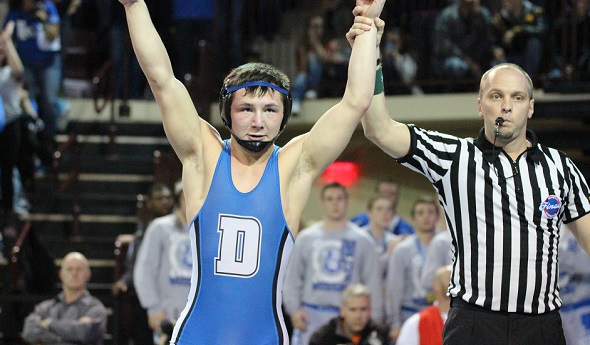
Dundee Dynasty's Secret: Keep Driving
By
Chip Mundy
Special for Second Half
January 13, 2017
By Chip Mundy
Special for Second Half
DUNDEE – The west entrance at Dundee High School, which leads to the gymnasium, makes something known to visitors in a hurry.
 The wrestling program is special.
The wrestling program is special.
On the left, across the hall from the wrestling room, team photos of all nine MHSAA champions adorn the wall along with photos of each wrestler who won the 35 Individual Finals titles in school history.
It is an impressive display honoring an impressive program.
“We call it our own little wall of fame,” Dundee wrestling coach Tim Roberts said. “We wanted to make sure all of our kids are recognized.”
Dundee has won the Division 3 championship in three of the past four years, and the Vikings have been in the championship match in nine of the past 10 years. That's the resume of a true state power.
While the wrestling tradition at Dundee has always been strong – the Vikings had an overall 925-155-5 record in dual meets since 1970 entering this season – it didn't appear in MHSAA team championship match until 1992-93, when it settled for a runner-up finish after losing to Constantine.
Making of a coach
When Roberts was wrestling at Dundee in the mid 1980s, the standards were different. While it still was a winning program, Dundee did not win a Regional title until 1987 – the year after Roberts graduated.
The Dundee coach at the time was local icon Jim Wittibslager, whose run included four consecutive MHSAA championships (1995-98) and a 333-36-3 career record in dual meets. Roberts was a fine wrestler from 1983-86 and is tied for 56th in school history with 122 wins.
However, Roberts felt like he had some unfinished business in wrestling. He qualified for the Individual Finals meet, but he failed to win a match. And that stuck with him.
“That was really the drive of getting me to coach,” he said. “All I wanted to do in high school was place at state one time. I lost in the blood round at state – back then we only placed six and I lost to the kid who ended up third. I lost some close matches, but there were some things I didn't do right. I lost by a point to the kid who finished second. I didn't accomplish what I wanted to in this sport in high school, and it made me not get over it. I wasn't satisfied with what I did.”
After graduating from Dundee, Roberts enlisted in the Army, and that turned into a life-changing experience.
“While I was in the Army, I learned some things, maybe indirectly, because my drill sergeant just pushed us in a way that made me get more out of myself than I ever had before,” he said. “I turned myself into something that I wasn't before, and I learned something about that.
“When I got out, I had a drive to want to help other kids to learn that they can do that. It wasn't just what you were born, that you can make yourself something better. I had a real drive to want to come back and help kids with that, and I still had a passion for what I wanted to accomplish in this sport. So then I had a goal. At the time, we had three state champs in school history, and my goal was for us to have more state champions and help more kids place at state, because that had been my goal.”
Roberts approached his former coach, Wittibslager, and asked about any opportunities as an assistant coach. Roberts was hired, and soon he had reached his goal.
“We did that, and I thought I was going to be done,” he said. “I got it out of my system. We got a guy, and I worked with him every day and I would pick him up in the summer and we'd wrestle, and he won state. I was feeling great, and I had gotten to where I wanted to get, and now I'm coaching his son. I thought I was going to be done, but here I am, still doing it, and I still have the passion to do it.”
After Dundee won four consecutive MHSAA team championships from 1995-98, Wittibslager retired, and Roberts was hired as his successor. The guy whose plan to come back was for just a few years not only was succeeding his high school coach but succeeding the reigning Wrestling USA Magazine National Coach of the Year.
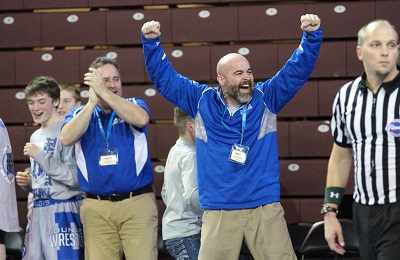 “There was pressure because Jim was one of the better wrestling coaches in Michigan history, so you're coming after that and trying to do your best,” Roberts said. “What I learned from him I tried to carry on. It was nerve-wracking the first few years doing it, and you're not sure if you know what he knew. I had to turn that off and apply myself and what I knew and keep moving forward and keep getting better.”
“There was pressure because Jim was one of the better wrestling coaches in Michigan history, so you're coming after that and trying to do your best,” Roberts said. “What I learned from him I tried to carry on. It was nerve-wracking the first few years doing it, and you're not sure if you know what he knew. I had to turn that off and apply myself and what I knew and keep moving forward and keep getting better.”
The job was to be Coach Roberts and try not to be Coach Wittibslager.
“I'd say a lot of what I do harkens back to those days,” Roberts said. “He was so good at it, it would be foolish not to take from him and learn from him. Obviously I'm not him, so I'm not going to do everything exactly as he did it, and I knew going in that I couldn't pretend to be him.
“To be successful, I had to be myself, but did I learn from him? Oh yes. Most of what I know about coaching I learned from him. I was very fortunate to be able to spend eight years with a guy who was that good coaching this sport and be able to learn from him.”
The promotion from assistant coach to head coach came with a few surprises as well.
“I was surprised at the amount of time and how much more you put of yourself into it once you're head coach,” he said. “As assistant coach, I thought I was totally living it and totally putting all of myself into it, and then as head coach, it just raises a whole new level.
“It's hard to realize that until you actually go through it. As an assistant coach, it's a little easier to make decisions here and there, and as a head coach you know that every decision made comes back at you. It was a transition.”
Richmond: The greatest rival
One of the best team rivalries in the state over the past decade has been Dundee and Richmond. They have combined to win the past seven Division 3 titles, and they have met in the championship match in six of the past 10 years, including four in a row from 2012-15. Dundee split those six championship matches with Richmond, further fueling the rivalry.
“It is fun,” Roberts said. “It's a challenge every year. They are very good, and that's the challenge to get your team at the level to compete with another team that's very good.
“They do a great job, and I have a ton of respect for them, and I think they have respect for us as well. It's been a great rivalry over the years.”
When he was a freshman, Brandon Whitman scored maybe the most memorable victory of his career against a wrestler from Richmond, even compared to Whitman’s victory last year to win an individual championship.
Devin Skatzka – who would go on to become one of only 21 four-time individual champions in MHSAA history – was a Richmond senior and ranked No. 1 at 160 pounds in Division 3, and he stepped up to 171 in the Hudson Super 16 meet two years ago this month. Whitman was ranked No. 1 at 171 in Division 3, so it was a great matchup, even though it was senior vs. freshman.
“That was pretty cool,” Whitman said. “It certainly boosted my confidence quite a bit, and I was pretty excited about it.”
It was even more exciting because of the rivalry with Richmond.
“I like going against Richmond,” Whitman said. “All the people from each town go there and watch when we wrestle, so it's a fun experience.”
Roberts remembers the feeling prior to the big match.
“It was a big moment for all of us,” he said. “Devin was a great Michigan high school wrestler. We knew that he was probably going to win his fourth state title that year, and to get an opportunity to wrestle a kid at that level and you're in ninth grade and going against him, that's special.
“I knew Brandon was good, and I knew Devin was very good. You just don't know how it's going to go. We're either going to learn a lesson here or have success.”
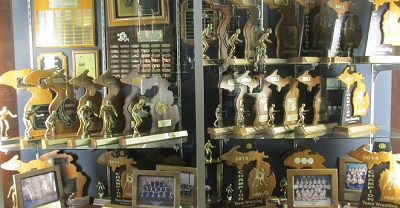 The same might be said for every time Dundee takes the mat against Richmond.
The same might be said for every time Dundee takes the mat against Richmond.
“You enjoy the competition; it keeps you hungry and drives you to keep getting better,” Roberts said. “I believe we have made each other better. We work really hard so we can beat them, and I think they work really hard so they can beat us.
“I know it has pushed me to new levels and to do new things and open up so I can be more competitive. I know they've made me better.”
Secret to success
If there truly was a secret to success, coaches might bottle it and sell it. But they likely wouldn't do so until after they retired.
Roberts just shrugged when asked about his secret to success.
“Honestly I don't know,” he said. “The only place that I've really done this is here, and I was able to do it with Jim. I wrestled in high school here, and then I took over and did it. So I don't know what we do that is different than anyone else.
“We have maintained success. I feel fortunate with the people we have in our program and all the work we put into it, but the secret that has helped us maintain our success? I can't tell you, I don't know what is different than anyone else. I know I have a lot of passion into it, and I know I've put a lot of time into it, and it's an endless pursuit in trying to get better and learn more about the sport.”
Whitman, a junior, believes Roberts and the coaching staff is a key – but not the only key – to that success.
“I think it's just the hard work we do,” he said. “Tim is a great coach. His coaching and the hard work we do are what make us successful.
“We start right after school around 3 o'clock and get out of practice around 7:30. We go from an hour and a half to two hours of lifting and around a two-hour practice follows after that.”
Hard work and great coaching certainly can help lead to success. And as Roberts talked about coaching technique and coaching the mental aspect, his philosophy became very clear.
“If you are going to be successful in this, you have to be all of it,” he said. “I think one of the great aspects of this sport is everything about you as a person will be exposed in this sport. If you are mentally not strong, it will be exposed. If you are technically not good, it will be exposed. If you are not strong enough, it will be exposed. If you are not in good enough shape, it will be exposed. You have to work at all of those things if you want to be a success.
“The goal is to get as good as you can at all of them and keep growing as a person as you do it. Some will excel more in one area than others but you try to be as rounded as you can. If you totally neglect one of them, it will be tough to be successful at the highest level.”
Ranked No. 1 – again
Dundee is ranked No. 1 in the latest Division 3 MichiganGrappler.com poll and unbeaten in dual meets this season. That’s par for the course at Dundee, which is coming off its first undefeated season in dual meets in school history. The Vikings are off to another undefeated start in duals this winter.
Roberts isn't out to record undefeated seasons, either. The Vikings traveled to Ohio around the holidays to participate in the highly competitive 48-team Brecksville Tournament and finished 21st with Whitman taking a first place and Tylor Orrison sixth.
“Of course you go out to win every match, but if losses weren't good, I would make our schedule so we wrestle all of the easiest teams,” Roberts said. “You need to go in those battles and learn about yourself and learn what you are not good at. You have to battle against good people to find that out, and if you do that, along the way you are probably going to have some losses.
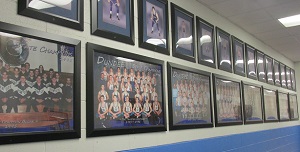 “It's all about learning lessons as you go, and then hopefully you are as ready as you can be by the end of the year.”
“It's all about learning lessons as you go, and then hopefully you are as ready as you can be by the end of the year.”
Whitman and senior Sean Sterling are reigning individual MHSAA champions for the Vikings. Whitman, who won at 189 pounds last year, is off to a 17-0 start, but Sterling has been sidelined with a rib injury and just recently returned to action.
Whitman was 57-2 as a freshman with both of his losses coming against Logan Massa of St. Johns, who was considered by some the top wrestler in the state regardless of weight class. As a sophomore, Whitman was 50-1 with his only loss coming in a 1-0 decision.
“Brandon really excels technique-wise because he works at it a lot,” Roberts said. “Brandon has so many different attacks that he can do. Most people have a few takedowns or maybe one or two that is their go-to move, and Brandon has about 10 of them. That's unusual, especially for a bigger guy like him to have that many attacks.”
Sterling, who plans to wrestle at Central Michigan University, was 47-4 last year en route to winning the Division 3 title at 152 pounds.
“He is a really tough competitor, and he is really smart about what he is doing out there,” Roberts said. “He's strong. I think he does well in all the aspects of wrestling. He has great technique, too.”
Even with such accomplished wrestlers as Whitman and Sterling, Roberts strives to help them and the rest become better.
“I strongly feel that my job as coach is to make you better and do all I can to make you better, so whatever you are, my job is to help you get better,” he said. “They are very good, but I am always looking at what can I do to help him get better.
“Nobody is at the ultimate, and guys like that have a ways to go because they have big goals and want to be successful in college. We know we still have growing to do.”
Dundee has two other returning wrestlers who placed at the Finals last year: Orrison was fourth at 135, and Alex Motylinski was sixth at 145. Orrison is off to a 17-3 start this season, while Motylinski is 14-2.
Roberts also has been encouraged by Caleb Fairchild, a 103-pounder who is 9-3.
“Caleb is ranked in the state, and when he came in, he was unsure of where he was at,” Roberts said. “He's doing a great job, and he's learned a couple of things he can do well, and I'm really proud of him.”
Winning might be common for Roberts, but it is far from routine.
“I've been fortunate enough as an assistant coach and head coach to be part of nine state championships, and every time it's been the best day of my life,” Roberts said. “That's nine times. It's really exciting.
“It's so hard to get all of it together and the work that goes in and the passion that you put into it. When you get it all together and everything works right and you achieved your goal, I still find that exciting. When it isn't exciting to me anymore, maybe I will retire.”
Dundee's all-time wrestling records
- Three-time MHSAA Finals champion: Cosell Beavers (2002-04)
- Most wins in a career: 237, Pete Rendina (2006-09)
- Most wins in a season: 65, Joe Rendina (2008-09)
- Most wins in a season without a loss: 64, Joe Rendina (2009-10)
- Most consecutive wins by a wrestler: 117, Joe Rendina (2009-11)
- Most consecutive wins by a team: 74 (1995-1997)
- Most pins in a career: 118, Jimmy Rowe (2005-08)
- Most pins in a season: 46, Jimmy Rowe (2007-08)
 Chip Mundy served as sports editor at the Brooklyn Exponent and Albion Recorder from 1980-86, and then as a reporter and later copy editor at the Jackson Citizen-Patriot from 1986-2011. He also co-authored Michigan Sports Trivia. E-mail him at [email protected] with story ideas for Jackson, Washtenaw, Hillsdale, Lenawee and Monroe counties.
Chip Mundy served as sports editor at the Brooklyn Exponent and Albion Recorder from 1980-86, and then as a reporter and later copy editor at the Jackson Citizen-Patriot from 1986-2011. He also co-authored Michigan Sports Trivia. E-mail him at [email protected] with story ideas for Jackson, Washtenaw, Hillsdale, Lenawee and Monroe counties.
PHOTOS: (Top) Sean Sterling's hand is raised after his victory for Dundee during last season's MHSAA Team Final against Remus Chippewa Hills. (Middle) Dundee coach Tim Roberts celebrates during the championship match win at Central Michigan University. (Below) The Dundee trophy case is full of hardware celebrating the wrestling program's succcess. (Click to see more action photos from HighSchoolSportsScene.com; trophy and wall photos by Chip Mundy.)
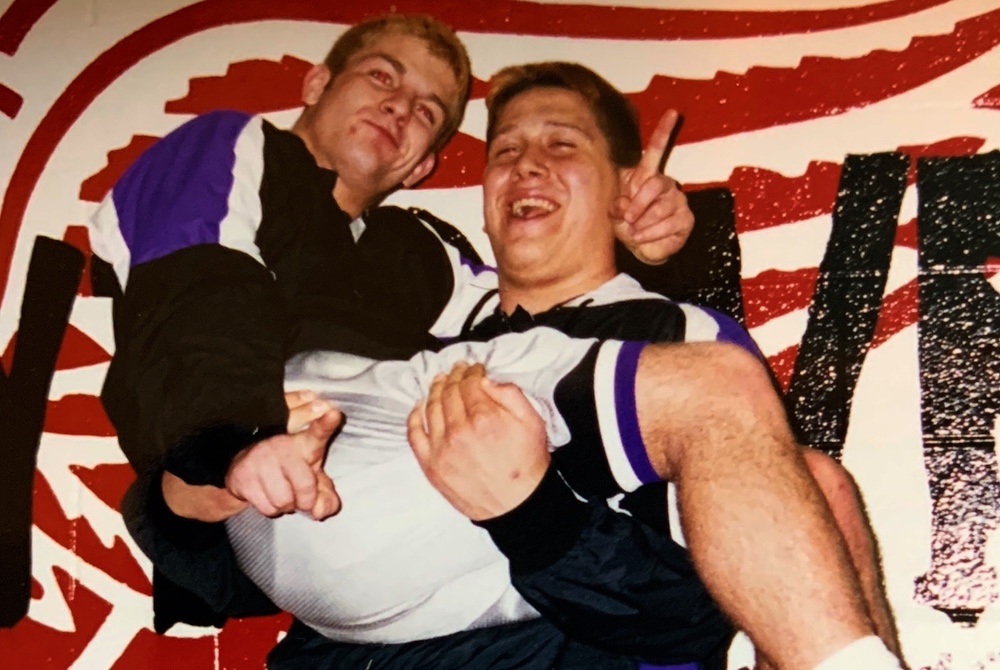
Caro Champs Find Common Ground Again as Mental Health Providers
By
Paul Costanzo
Special for MHSAA.com
July 8, 2021
Phil Millerov and Phil Niklowicz wanted to do more than simply defeat opponents when wrestling at Caro High School.
They wanted to dominate – physically and mentally.
 “We had this thing between us where we wanted to be done, and (opponents) didn’t want to come back on the mat with us,” Millerov said.
“We had this thing between us where we wanted to be done, and (opponents) didn’t want to come back on the mat with us,” Millerov said.
Twenty years later, both spend their days building people up. Millerov is a licensed professional counselor, while Niklowicz is a licensed therapist.
“I went out there looking to dominate and make sure it was known that I am the superior wrestler in all facets,” Niklowicz said. “I would try to run up as many points as fast as I can. I would teach the same thing when coaching, specifically with my nephew. You’re saying, ‘Listen, we want to break these people.’ Then the next day, in a therapy session, it’s like, ‘Let’s build up your self-esteem and set some goals to boost ourselves up.’”
The close friends and two faces of Caro’s surging wrestling program in the late 1990s now have very similar careers. Millerov – who finished second, third and first at 275 pounds in the 1998, 1999 and 2000 MHSAA Finals, respectively -- works in private practice at Transitions Counseling Service in Greenville, where he specializes in substance abuse disorders. He also has served as a Class 1 Fellow at the WK Kellogg Foundation.
Niklowicz – a two-time MHSAA Finals champion (1999 and 2000) and four-time placer – is working in private practice in Southfield, seeing mostly children. He also works in adult foster care with patients who have had traumatic brain injuries.
“He and I went and hiked Pictured Rocks at the beginning of May,” Millerov said. “And we joked about how nobody would have guessed that we’d be doing this now.”
That Millerov and Niklowicz are still close does not come as a surprise. Their friendship began when their wrestling careers did, as 6-year-olds in the Caro Growlers program. As they were becoming two of the state’s top wrestlers, they would share rides to tournaments, and their families grew close.
In high school, despite their size difference – Niklowicz wrestled at 135 his senior year – it wasn’t uncommon to see them warming up together.
“We were definitely easy going and liked to mess around a lot,” Niklowicz said. “We used to mess around before meets and throw each other. He would jump and I would throw him. People would look at us like, ‘Why is that little guy throwing that big guy?’”
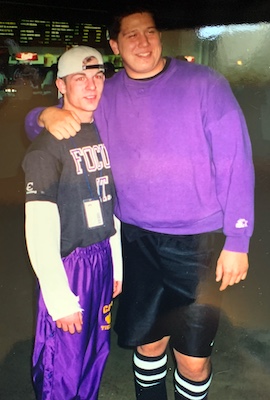 While their teams never made it out of the Regional, Millerov and Niklowicz helped set the stage for a program that would become among the best in Division 3 throughout the 2000s, qualifying for five straight Quarterfinals from 2003-07 and winning the Division 3 Finals title in 2003.
While their teams never made it out of the Regional, Millerov and Niklowicz helped set the stage for a program that would become among the best in Division 3 throughout the 2000s, qualifying for five straight Quarterfinals from 2003-07 and winning the Division 3 Finals title in 2003.
Individually, they were among the most well-known and feared wrestlers in the state.
“Niklowicz and I were fortunate to have each other, because we pushed each other,” Millerov said. “We were in constant competition with each other and ourselves. Just to kind of push each other, it was a great thing.”
Niklowicz finished fifth as a freshman and third as a sophomore before winning back-to-back titles to close out his career. In 1999, he defeated Nick Oertel of Goodrich 9-2 in the 125-pound final, and the next year he defeated Oertel’s teammate, Ryan Tripp, 7-5 at 135. Tripp would go on to win an individual title the following year. Niklowicz would finish his career with 214 victories.
“I think probably both (Finals titles) were equal,” Niklowicz said. “I think there was probably a little more stress going into my senior year. My motivation always came from improving, then it was maintaining the state title. You don’t want to go the opposite direction.”
Millerov lost a tight 6-4 decision against Remus Chippewa Hills’ Bob Kozlowski in the MHSAA Finals as a sophomore, and had an epic 12-10 match against future NFL defensive lineman Jason Babin of Paw Paw in the 1999 semifinals before fighting back to take third. The next year, he won his title via first-period pin against Dan Kliphuis, a two-time runner-up from Grand Rapids West Catholic. Millerov finished with 196 career wins and set the state record for pins in a career (160), which was broken the next season by Nick Simmons of Williamston and is now held by Justin Zeerip of Hesperia. The 56 pins Millerov recorded his senior season remains second all-time to Simmons, who had two seasons with 57.
“I never really thought about (the pin record) to be quite honest,” Millerov said. “It was just kind of in the background. It didn’t matter; all I cared about was winning this match, and I wanted to do it in the most effective, efficient way I could.”
They both continued their wrestling careers, but went their separate ways in college, with Millerov heading to Neosho County Community College in Kansas and Niklowicz to Virginia Tech.
Millerov had interest from several Division I schools coming out of high school, including some in the Big Ten, but he admits his grades weren’t good enough at the time. Neosho provided a chance to compete with some of the best in the country while at the junior college level, however, as the team took second at the National Junior College Athletic Association championships in 2002.
He transferred to Central Michigan after his sophomore year, joining his girlfriend – now his wife – who was already attending, and walking onto the wrestling team. While his relationship lasted, wrestling did not.
“I was distracted,” Millerov said. “My grandmother passed away in 2002 in that summer. I was trying to get that motivation back, and I just lost it. There has to be that edge with wrestling. When things didn’t work out, I struggled. Wrestling was my identity.”
Millerov was working to follow in his father’s footsteps and become a police officer. But the elder Phil Millerov, who died in 2012, talked his son out of it.
“Looking back on it, for me, it was obviously the right decision,” Millerov said.
The idea to go into counseling came after Millerov was married in 2006, as his wife had gotten into the program. He went back to school to earn his bachelor’s degree from CMU in 2007, and would go on to get his master’s from CMU, as well.
“I had taken a bunch of psychology courses just because I liked the field,” Millerov said. “I liked to be challenged. I liked puzzles, and with psychology, it’s like a new puzzle every hour. It just clicked. I flew through and graduated with like a 3.8. I was like, ‘Wow, I kind of feel smart.’ It was good to find something I was passionate about again.”
Millerov said he’s constantly learning and honing his craft, much like he did as a wrestler. A major difference now, however, is that he’s found more balance in his life.
“I think about working with athletes in addiction, I find a lot of similarities,” he said. “Wrestling was my life, it’s how I identified myself. I hear that same kind of talk around people struggling with addiction. One you’re considered successful for, the other you’re not. Most of my growth has been around finding balance. I find that my happiness and my clients’ as well, is when we found that balance instead of being good at just one thing. I want you to have passion, I want you to do things you love, but I also want you to be effective as a husband, a father, whatever other responsibilities you have.”
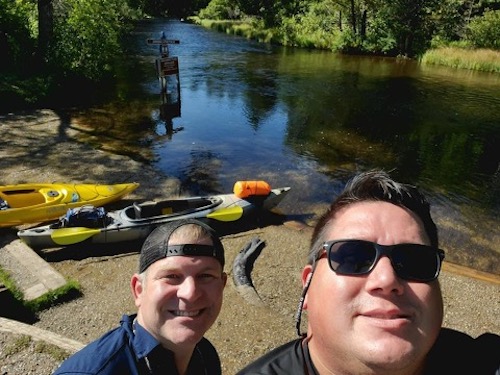 Niklowicz’s journey to becoming a therapist was more telegraphed, as both of his parents work in mental health, and he said it was always something he wanted to do, as well.
Niklowicz’s journey to becoming a therapist was more telegraphed, as both of his parents work in mental health, and he said it was always something he wanted to do, as well.
He attended Virginia Tech on a wrestling scholarship, but transferred to Eastern Michigan after one year. The Hokies had recruited him to wrestle at 133 pounds, but when the team’s 125-pounder was injured, Niklowicz was asked to cut down further. Like Millerov, he struggled when his wrestling career ended.
“I just had a really bad taste in my mouth after leaving Virginia Tech and trying to cut all this weight,” he said. “Some of it was I had lost the desire to work out, to wrestle. Fifteen years, roughly, of my life was dedicated to wrestling, and once you stop, what do I do with my winters? What do I do with seven months of the year? It was definitely a part of my identity; that’s why I got into coaching. I did MMA fighting for a little bit to have something competitive.”
Like Millerov, Niklowicz said finding balance was important.
“In the mental health field, specifically, there’s a lot of burnout for people,” he said. “Every day, you’re listening to people talking about their problems, but at the same time, they’re coming for a reason and they’re there for help, so you have to provide that help and have to motivate yourself to come to the office every day and give it your best. I try to instill the motivation that I used to other people.”
When Niklowicz looks at his time as an athlete compared to his work as a therapist, he said that work ethic is the main characteristic that has carried over.
“I think my practice mentality was the same as it was on the mat,” he said. “Even in the wrestling room, these are people I’m friends with, people I grew up with, and I still didn’t want anyone to score on me. Then you just look at your work ethic outside of wrestling, whether you’re studying for exams or motivating yourself to get up and go to class.”
While they are no longer living in the same town or living similar lives – Millerov is married with three kids, while Niklowicz is single – the connection between Caro’s dominant duo remains strong, both professionally and personally.
“I don’t think we ever thought we would be going down such a similar path, and I doubt that either one of us grew up thinking we would do the exact same thing,” Niklowicz said. “We met when we were 6 years old, and we’ve been best friends forever. I think it’s hilarious that we’ve taken such similar paths but with some glaring differences. It’s definitely interesting that we’re still really good friends after 30-some years, especially since we’ve moved on and gone our separate ways.”
2020-21 Made in Michigan
June 28: Michigan's Minor Leaguers Making Up for Lost Season - Read
PHOTOS: (Top) Caro’s Phil Millerov lifts teammate Phil Niklowicz as both celebrate Division 3 championships during the 2000 Individual Finals at Joe Louis Arena. (Middle) Niklowicz, left, and Millerov were high school warm-up partners despite wrestling at significantly different weights. (Below) Niklowicz and Millerov take a selfie during a hiking trip to Pictured Rocks National Lakeshore in May. (Photos courtesy of Niklowicz and Millerov.)

